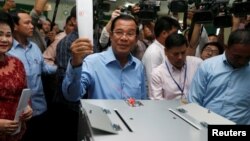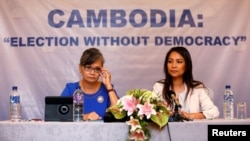The Cambodian People’s Party (CPP) says it has won every seat in the country’s parliament.
The party released the statement after national elections on Sunday. The results would effectively make Cambodia a one-party state.
The CPP said it now controls all 125 seats in the National Assembly. But rights groups say the election results are misleading because the main opposition party was banned.
Sok Eysan is a spokesman for the CPP. He said he could not confirm the official vote count, “but I can say that the CPP will get most of the seats at the National Assembly.”
“The result of the election shows that there is a progression of democracy in Cambodia, as people used their right to decide the future of the country,” he said.
Cambodian Prime Minister Hun Sen is now set to extend his already 33 year rule by another five years.
Nineteen minor parties took part in the election. They won only a small percentage of the vote.
Information released Monday by the National Election Committee (NEC) also suggests the CPP will win every assembly seat. The committee says more than 6.8 million registered voters marked ballots. There were almost 600,000 invalid ballots. The Associated Press news agency reports that they appeared to be cast as protests by voters who wished to keep their identities secret.
The CPP’s only real opponent in the election, the Cambodia National Rescue Party (CNRP), was dissolved late last year. Its leader Kem Sokha was put in jail. He was accused of inciting an internationally supported plot to overthrow the government.
In reaction, the CNRP launched what it called a “clean finger” campaign, urging voters to boycott the general elections.
Hun Sen’s government threatened criminal action against supporters of the campaign. The government also threatened action against Cambodian citizens if they chose to not vote.
Criticism of the elections came from Western governments and other groups.
The United States called the vote neither “free nor fair.” The U.S. government said it would consider punitive measures, including an expansion of visa restrictions on top Cambodian government officials.
In a statement, the White House office of the Press Secretary said, “We are profoundly disappointed in the government’s choice to disenfranchise millions of voters, who are rightly proud of their country’s development over the past 25 years.” The statement went on to say that the campaign was marked by threats from national and local leaders to punish those choosing not to vote.
Australia’s foreign minister, Julie Bishop, also questioned the election results. In a statement, she said that Hun Sen’s actions to remove his political opponents have cancelled more than 25 years of progress toward democracy.
Australia, the United States, Canada, the European Union and Japan all said they had no plans to send representatives to observe the voting.
The national election commission said it would announce full totals on August 11. The official results will be released on August 15.
I’m Jonathan Evans.
Jonathan Evans adapted this story from VOA News and AP reports. George Grow was the editor.
_______________________________________________________________
Words in This Story
disenfranchise – v. to prevent a person or group of people from having the right to vote
punitive – adj. intended to punish someone or something
proud – adj. very pleased because of something you have done
dissolved – v. dismissed
cast – v. to send something in the direction of someone or something; to throw or move
invalid – adj. having no effect






